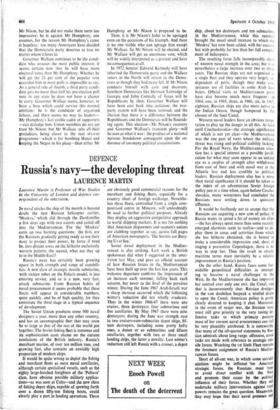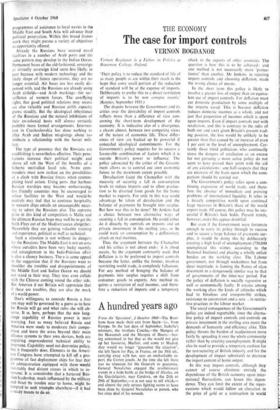Russia's navy—the developing threat
DEFENCE
LAURENCE MARTIN Laurence Martin is Professor of War Studies in the University of London and defence cor- respondent of the SPECTATOR.
In naval circles the ship of the month is beyond doubt the new Russian helicopter carrier, 'Moskva,' which slid through the Dardanelles a few days ago with two escorts and sailed off into the Mediterranean. For the 'Moskva' sums up two burning questions: the first, are the Russians gradually getting ready to use their navy to project their power, by force if need be, into distant areas on the hitherto exclusively western pattern; the second, what are they up to in the Middle East?
Russia's navy has certainly been growing apace in both strength and range of capabili- ties. A new class of strategic missile submarine, with sixteen tubes on the Polaris model, is just entering service, and so is a new, very fast, attack submarine. From Russian habits of naval procurement it seems probable that these boats will appear in considerable numbers, quite quickly, and be of high quality, for they constitute the third stage in a typical sequence of development.
The Soviet Union produces some 900 naval designers a year, more than any other country, and has an oceanographic fleet that may soon be as large as that of the rest of the world put together. The Soviet fishing fleet is immense and its sophistication casts shame on the current revelations of the British industry. Russia's merchant marine, of over ten million tons, and growing fast, also contains an enviably high proportion of modern ships.
It would be quite wrong to depict the fishing and merchant fleets as mere naval auxiliaries, although certain specialised vessels, such as the eighty large-hatched freighters of the 'Poltava' class, have obvious possible military applica- tions—as was seen at Cuba—and the new class of fishing depot ships, capable of spewing forth over a dozen fifty-ton fishing boats, could clearly play a part in landing operations. There
are obviously good commercial reasons for the merchant and fishing fleets, especially for a country short of foreign exchange. Neverthe- less these fleets, controlled from a single corn- puterised centre in Moscow, will undoubtedly be used to further political purposes. Already they display an aggressive competitive approach to world shipping markets. It is not for nothing that American shipowners and seamen's unions are clubbing together to say, across full pages of American newspapers, 'The Soviets are Bury- ing Us at Sea.'
Soviet naval deployment in the Mediter- ranean is also striking. Last week a British spokesman did what I suggested in the SPEC- TATOR last May, and gave an official account of how Russian forces in the, Mediterranean have been built up over the last few years. This welcome departure confirms the impression of an increase each summer, falling back each autumn, but never to the level of the previous winter. During the June 1967 Arab-Israeli war a sharp increase occurred which the following winter's reduction did not wholly eradicate. Thus in the winter 1966-67 there were one cruiser, three destroyers, four submarines and five auxiliaries. By May 1967 there were nine destroyers; during the June war strength rose to two cruisers-cum-submarine depot ships, fif- teen destroyers, including some pretty hefty ones, a dozen or so submarines and fifteen auxiliaries, together with two or three small landing ships, the latter a novelty. Last winter's reduction still left Russia with a cruiser, a depot
ship, about ten destroyers and ten submarine, in the Mediterranean, while this summer brought the usual small increase to which the 'Moskva' has now been added, with her escorts. but with probably far less than her full comple- ment of helicopters.
The resulting force falls incomparably sho:t of western naval strength in the area; but it is nevertheless a large increase over two or three years. The Russian ships are not organised a, a single fleet and they operate very largely in-
dependent of ports, though they make con- spicuous use of facilities in some Arab har- bours. Official visits to Mediterranean ports
have also become much more frequent: in 1964, one, in 1965, three, in 1966, six, in 1967. eighteen. Russian ships are also more active in the- Indian Ocean, though hampered by the closure of the Suez Canal.
Western naval leaders have an obvious temp. tation to play up the danger in all this. At least
until Czechoslovakia—the strategic significance of which is not yet clear—the Mediterranean was the one part of NATO where the military
threat was rising andipolitical stability lacking.
For the Royal Navy, the Mediterranean situa- tion has a special interest as a possible justifi- cation for what may soon appear to an unkind eye as a surplus of strength after withdrawal from east of Suez and with naval war in the Atlantic less and less credible to political leaders. Russian deployment also has a more than naval significance if it should be taken as the index of an adventurous Soviet foreign policy just at a time when, again before Czecho- slovakia, many westerners had concluded the Russians were settling down to quiescent affluence.
It would be foolhardy not to accept that the Russians are acquiring a new arm of policy. If Russia wants to spend a lot of money on ships —she has always spent more than some recently emerged alarmists seem to realise—and to de- ploy them in areas and activities from which she has hitherto abstained, she is bound to make a considerable impression and, short of staging a preventive Copenhagen, there is no way to stop her. Thus the result in strictly maritime terms must inevitably be a relative improvement in Russia's position.
On the other hand, Russia faces some for- midable geopolitical difficulties in attempt- ing to become a naval challenger to the West. In the Mediterranean she has improved her control over only one exit, the Canal, and that is inconveniently shut. Russian dredgers
in the UAR doubtless bespeak a wistful desire to open the Canal; American policy is pretty
clearly directed to keeping it shut. Moreover, in the event of major war, the Russian navy must still give priority to the very taxing de- fensive tasks to which primary purpose most of her current naval procurement can still be very plausibly attributed. It is noteworthy
that many of the oft-quoted statements by Rus- sian admirals about long range. offensive, naval tasks are Made with- reference to strategic mis- sile forces. Watching the us Sixth Fleet remains the foremost assignment of Russia's Mediter- ranean forces.
Short of all-out war, in which some -suicidal attrition might be inflicted ton American strategic forces, the Russians must hope to avoid direct conflict with the West and promote their cause by the -political influence of their forces. Whether they Will undertake military interventions against local powers remains the 'great question. Meanwhile, they may hope that their naval presence and
programmes of assistance to local navies in the Middle East and South Asia will advance their political penetration. Within this broad frame- work they might pursue a variety of objectives as opportunity offered.
Already the Russians have secured naval facilities in a number of Arab ports and the same pattern may develop in the Indian Ocean.
Permanent bases of the old-fashioned, sovereign or virtually sovereign kind seem less likely, in part because with modern technology and the likely shape of future operations, they are no longer essential. Air bases are less easily dis- pensed with, and the Russians are already using Arab airfields—and Arab markings—for sur- veillance of western forces. The overflying rights that good political relations may secure are also valuable and Russian airlift capacity grows steadily. But the ideological inheritance of the Russians and the natural inhibitions of their ex-colonial hosts will almost certainly prohibit more formal arrangements. Interven-
tion in Czechoslovakia has done nothing to allay Arab- and Indian misgivings about too intimate a relationship with the Soviet mili- tary.
The type of presence that the Russians are establishing is nevertheless effective. Their pene- trations increase their political weight and
above all rob the West of the benefits of a hitherto unrivalled local role. NATO com-
manders must now reckon on the possibilities
of a clash with Russian forces when contem- plating local action. Using ports that harbour
Russian warships may become embarrassing, less friendly countries may be encouraged to refuse facilities to the West and would-be neutrals may feel that to continue hospitality
to western ships entails an unacceptable neces- sity to admit the Russians also. The supreme prize in this kind of competition is Malta and the ultimate Russian hope may well be to get the Sixth Fleet out of the Mediterranean altogether. Meanwhile they are gaining valuable training and experience, political as well as technical.
Such a situation is not without its dangers for the Russians. The Middle East is not an area where outsiders have been very lucky recently and entanglement in the Indo-Pakistan affair is also a chancy business. There is some appeal in the suggestion that if the Russians want to shoulder the troubles and disappointments of the Middle East and Indian Ocean we should not stand in their way. They may even collide with the Chinese coming round the other side. But America if not Britain will appreciate that if these are troubles, they are also the mark of a world power.
One's willingness to concede Russia a free run may well be governed by a guess as to how far Russia will go and what rules she will ob- serve. It is, here, perhaps that the new long- range capability of Russian power is most worrying. Just as many believed Russia and America were ready to moderate their compe- tition and leave the areas beyond their main alliance systems to their own devices, both are acquiring unprecedented technical ability to intervene. Capability need not determine policy, but it frequedtly does. Elements in the Ameri- can Congress have attempted to kill off a pro- gramme of fast deployment ships for fear that an administration equipped with them.-wbuld inevitably find distant causes in which to in- tervehe: It is conceivable that a harassed Rus- sian leadership. much influenced by the Military and beset by trouble near to home, might be tempted :to seek triumphs elsewhere—if it had a ready means to do so.







































 Previous page
Previous page